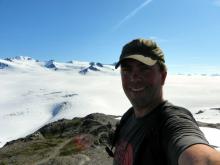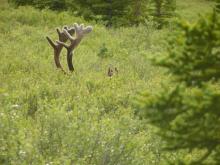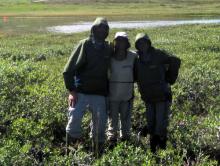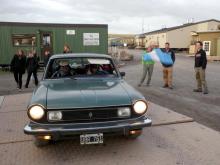Update
Archived PolarConnect Events
Nick and Amanda held two successful events – one or teachers, and one for students and the public. The events are available in the PolarConnect Archives.
What Are They Doing?
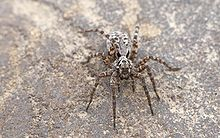 Wolf Spider
Wolf Spider
While arctic species are all well adapted to living in extreme environments, it is unclear whether different species will respond similarly or differently to the environmental shifts that accompany climate change (e.g. longer growing seasons and warmer temperatures). Stronger responses by some species within a community, or strong responses by certain species groups, could lead to changes in the structure of the food web and its role in arctic ecosystems.
For example, In the Alaskan Arctic, wolf spiders are the largest and most abundant invertebrate predators. A shift in their ecological role could therefore have an important impact on the entire food web. Evidence from Arctic Greenland shows that wolf spider body sizes are becoming larger in response to longer growing seasons. These increases in body size will likely lead to larger spider populations, which could imply an increase in predation on the rest of the community.
This project explored the role of wolf spiders within arctic communities and specifically, whether climate change is stimulating changes in these predators that could influence the structure and functions of arctic food webs. The research team used a variety of methods to examine the impact of wolf spiders, including sampling spiders from various locations around Toolik Lake and carrying out a manipulative experiment that looked at the entire food web.
Where Are They?
 Stream near Toolik Lake, Alaska
Stream near Toolik Lake, Alaska
The research team lived and worked out of Toolik Field Station, located in the northern foothills of the Brooks Range in northern Alaska. Toolik Field Station is operated by the Institute of Arctic Biology at the University of Alaska Fairbanks and has hosted hundreds of researchers and students every year since 1975.
Latest Journals

Amanda Koltz is a PhD candidate in ecology at Duke University under Dr. Justin Wright. Her research focuses on the relationship between community and ecosystem ecology (e.g. how species interactions can affect key ecosystem processes like decomposition and nutrient cycling). For her dissertation research, she is exploring how climate-induced changes in predatory spiders are influencing the structure and function of food webs in the Arctic. You can learn more about Amanda's research here.

